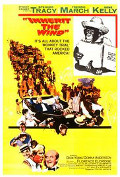
Directed by
Stanley Kramer
127 minutes
Rated PG
Reviewed by
Bernard Hemingway

Inherit the Wind
In the spirit of his 1958 film, The Defiant Ones (1958) which mounted a quite programmatic assault on racism, Stanley Kramer heads back down South for this real-life based story about a Tennessee schoolteacher, John Scopes (here called Bertram Cates and played by the rather simian-looking Dick York who became a household name later in the decade thanks to the inexplicable popularity of long-running TV series Bewitched), who in 1925 was put on trial for violating the Butler Act, a state law that prohibited public school teachers from teaching evolution instead of creationism. Dubbed “The Monkey Trial” it drew intense national interest with two of the nation's leading lawyers, Christian William Jennings Bryan and Clarence Darrow (renamed Matthew Harrison Brady and played by Fredric March, and Henry Drummond, played by Spencer Tracy) taking up the cudgels during a twelve day battle. Gene Kelly plays a cynical reporter, E. K. Hornbeck, whose character was based on well-known journalist and writer of the times, H. L. Mencken.
Based on a hit Broadway play by Jerome Lawrence and Robert E. Lee, it is a heavy-going, very wordy affair that on the one hand lacks the economy and clarity of 12 Angry Men, Sidney Lumet’s classic courtroom drama from two years earlier, on the other, crunches through the actual process of the trial with scant attention to detail.
Although both March and Tracy are both called upon to give scenery-chewing performances, March, in a very dodgy bald wig doesn’t convince, lacking the presence of a man who was in real life a three-time Presidential candidate, a former Secretary of State, a much-admired orator and Christian zealot. A role like this called for an Orson Welles, even better, Welles himself. Tracy, on the other hand, is well in his comfort zone as the no-nonsense civil liberties advocate to whom falls the duty of articulating the issue at stake which is not who made the world but the individual’s right to express his point of view. With a certain B grade quality supplied by a sub-plot (presumably complete fiction) involving the town’s Bible-bashing pastor (a mis-cast Claude Akins) and his teacher daughter Rachel (Donna Anderson) who is engaged to Cates, It is Tracy who keep the film above the water-line.
Whilst the film takes a quite mordant view of American society as a deadening mix of self-interest and conformism (understandably so, as it was scripted by blacklisted screenwriters Nedrick Young, aka Nathan E. Douglas, and Harold Jacob Smith who had provided this service for The Defiant Ones) the film ends on a rather lame conciliatory note with Tracy’s triumphant lawyer walking on into the future to the strains of the populist flag-waver, 'The Battle Hymn of the Republic".
Want something different?





